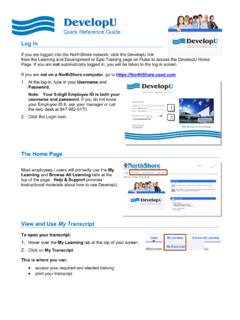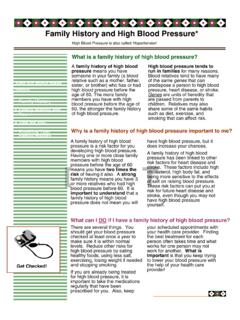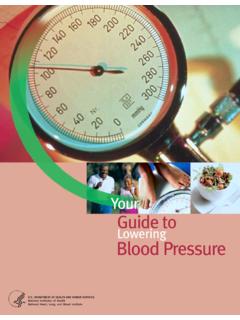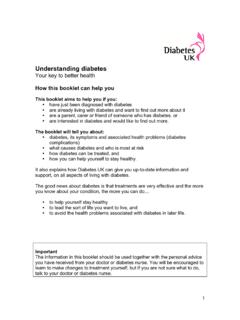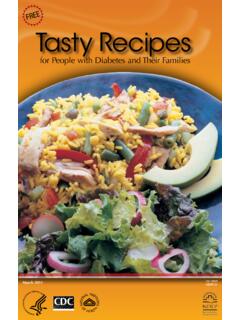Transcription of Type 2 Diabetes: Recently Diagnosed
1 Dear Patient: Welcome to NorthShore University HealthSystem (NorthShore). We are committed to supporting you in your educational process. This packet has been designed to provide you with important basic information about diabetes , to get you started, and to introduce you to our team of Certified diabetes Educators who are the experts in the field of diabetes and are available to provide service to you. If your Doctor has requested that you test your blood sugars, our educators may provide you with a free blood glucose monitor, as well as demonstrate to you how to use it. The following phone numbers are provided for you to call if you have any questions or to make an appointment: 847-926-5032 Educators at Highland Park Hospital and Glenbrook Hospital 847-663-8540 Educators at Old Orchard Office (endocrinologist visit required) 847-570-2016 Educators at Evanston Hospital We thank you for choosing NorthShore.
2 Type 2 diabetes : Recently Diagnosed What is type 2 diabetes ? The cells in your body need insulin to change glucose, the sugar that comes from the food you eat, into energy you need to live. Without insulin, this sugar cannot get into your cells to do its work. It stays in your blood instead. Your blood sugar level then gets too high . Type 2 diabetes usually begins with insulin resistance. This means that your pancreas is making enough insulin, but your cells are not able to use it. When your cells don t get the sugar they need, your pancreas works harder at first to make more insulin.
3 But after a while, your pancreas stops being able to make enough insulin. high blood sugar can harm many parts of the body. It can damage blood vessels and nerves throughout your body. You will have a bigger chance of getting eye, heart, blood vessel, nerve, and kidney disease. Your weight, level of physical activity, and family history affect how your body responds to insulin. People who are overweight, get little or no exercise, or have diabetes in the family are more likely to get type 2 diabetes . Type 2 diabetes is usually found in adults, which is why it used to be called adult-onset diabetes . But now more and more children and teens are getting it too.
4 Type 2 diabetes is a disease that you will always have, but you can live a long and healthy life by learning how to manage it. What are the symptoms? Many people have symptoms such as increased thirst and urination, weight loss, and blurred vision. Some people do not have symptoms, especially when diabetes is Diagnosed early. How is type 2 diabetes Diagnosed ? Most likely you found out that you have diabetes when you saw your doctor for a regular checkup or for some other problem. Your doctor probably Diagnosed type 2 diabetes by examining you, asking about your health history, and looking at the results of blood sugar tests.
5 How is it treated? A healthy diet helps keep your blood sugar under control and helps prevent heart disease. Eating the right amount of carbohydrate at each meal is very important. Carbohydrate is found in sugar and sweets, grains, fruit, starchy vegetables and milk and yogurt. A dietitian or a certified diabetes educator can help you plan your meals. Eating right and getting more exercise are enough for some people to control their blood sugar levels. Others also need to take one or more medicines, including insulin. You may need to take other steps to prevent other problems from diabetes .
6 These problems are called complications. People with diabetes are more likely to die from heart and blood vessel problems like heart attack and stroke. If you are 30 or older, talk to your doctor about taking a low-dose aspirin each day to help prevent these or other large blood vessel diseases. You may also need medicine for high blood pressure or high cholesterol . If you smoke, quitting may help you avoid problems with your heart and large blood vessels. What kind of daily care do you need? The key to managing your diabetes is to keep your blood sugar level as close to normal as you can. You do this by eating right, exercising, and checking your blood sugar level every day.
7 Some people also need to take medicine. Learning the skills you need to manage your diabetes will take time, but soon they will become part of your daily routine. It can be hard to accept that you have diabetes , especially if you have no symptoms. Feeling angry or frightened can prevent you from following your treatment plan. Talking about your feelings may help. Your doctor or other health professionals can help you cope with your diagnosis. General Nutrition Guidelines for Individuals with diabetes Achieve or maintain a reasonable body weight. Eat at least 3 well-balanced meals each day.
8 Try not to skip meals. Eat at consistent times every day. Spread carbohydrates evenly throughout the day because carbohydrates have the greatest affect on blood sugar levels. Control portions sizes of carbohydrate rich foods to help control blood sugar levels. Practice weighing and measuring foods to determine correct portion sizes and amounts. Look for the Total Carbohydrate grams on Nutrition Facts Labels to determine carbohydrate content. Do not look at Sugar because sugar is included in the total carbohydrate. Be aware that Sugar Free and Fat Free foods almost always contain carbohydrate which will need to be worked in to your meal plan.
9 Limit or avoid sweets such as candy and regular soda pop. Remember that these foods contain high amounts of carbohydrate so if you would like to work them into your meal plan, keep the portion sizes small. Include fiber-rich foods in your meal plan by choosing whole grain breads and cereals, fresh fruits and vegetables. high fiber diets help to lower your risk for heart disease. Avoid too much total fat, saturated fat and cholesterol by reading the Nutrition Facts Labels on food items. Also choose lean cuts of meat (look for the words loin or round and try baking, broiling, roasting, steaming, or grilling meats to reduce the fat content.)
10 Low fat diets help to prevent weight gain and lower your risk for heart disease. Use unsaturated fats (like oils, nuts, and seeds) when cooking and baking instead of saturated fats like butter and lard to help raise your good cholesterol and lower your bad cholesterol . Foods and beverages with less than 5 grams of carbohydrate per serving are considered free foods. Black coffee, unsweetened sugar-free carbonated beverages, broth, sugar-free gelatin are in this category. WHAT IS A CARBOHYDRATE? Carbohydrates are the sugar, starch, and fiber in foods and they are the body s main energy source. As one of the three macronutrients carbohydrates (along with protein and fat) give a food Calories.







